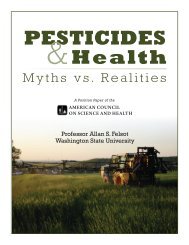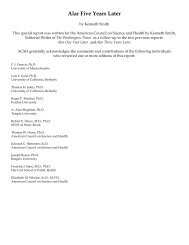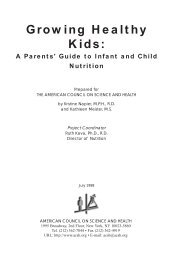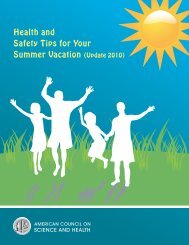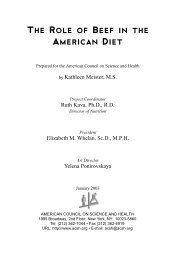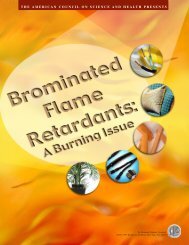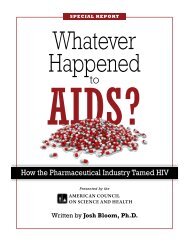View pdf - American Council on Science and Health
View pdf - American Council on Science and Health
View pdf - American Council on Science and Health
Create successful ePaper yourself
Turn your PDF publications into a flip-book with our unique Google optimized e-Paper software.
Although <strong>on</strong>e doesn’t often think of h<strong>and</strong> washing<br />
at a picnic, bacteria <strong>and</strong> viruses are no<br />
respecters of vacati<strong>on</strong> or leisure-time activities. If<br />
no h<strong>and</strong> washing facilities will be available, take<br />
pre-moistened towels with h<strong>and</strong> soap added, <strong>and</strong><br />
fresh <strong>on</strong>es for “rinsing.” These precauti<strong>on</strong>s are<br />
particularly important for those who prepare <strong>and</strong><br />
h<strong>and</strong>le the food!<br />
Safety During Electrical Storms<br />
You can minimize your chances of being injured<br />
during an electrical storm by avoiding open areas<br />
<strong>and</strong> seeking shelter indoors or inside a closed<br />
automobile. Hiding under trees or touching metal<br />
objects (e.g., golf clubs) increases your chances<br />
of being struck by lightning.<br />
The teleph<strong>on</strong>e company advises that you should<br />
not use the ph<strong>on</strong>e during an electrical storm.<br />
Although protective measures are used to keep<br />
dangerous electrical surges from entering your<br />
home through your teleph<strong>on</strong>e wires, complete<br />
protecti<strong>on</strong> is impossible. Thus, there is a quite<br />
remote but real risk of electrical shock if you use<br />
the ph<strong>on</strong>e during an electrical storm.<br />
Insect Bites <strong>and</strong> Stings<br />
Not <strong>on</strong>ly are insect bites <strong>and</strong> stings annoying <strong>and</strong><br />
sometimes painful, they may also pose serious<br />
health risks. In some areas, mosquitoes can transmit<br />
diseases such as encephalitis <strong>and</strong> West Nile<br />
virus, <strong>and</strong> ticks can carry serious illnesses like<br />
Rocky Mountain spotted fever <strong>and</strong> Lyme disease<br />
(see secti<strong>on</strong> following). The best way to deal with<br />
bites <strong>and</strong> stings is to prevent them whenever possible.<br />
Repellants, while easy <strong>and</strong> effective, should<br />
be used with care. The EPA recommends:<br />
• Apply repellents <strong>on</strong>ly to exposed skin <strong>and</strong>/or<br />
clothing—not under clothing.<br />
• D<strong>on</strong>’t use <strong>on</strong> cuts, wounds or irritated skin.<br />
• Do not let children h<strong>and</strong>le repellents, <strong>and</strong> d<strong>on</strong>’t<br />
apply to their h<strong>and</strong>s.<br />
• Apply to h<strong>and</strong>s <strong>and</strong> then apply <strong>on</strong> face—d<strong>on</strong>’t<br />
apply or spray directly <strong>on</strong> face.<br />
• D<strong>on</strong>’t spray repellent in enclosed areas or<br />
around food. Avoid breathing sprays.<br />
Insect bites <strong>and</strong> stings can also pose serious<br />
threats to those who become allergic to them. In<br />
the most serious cases, a sting or bite can cause<br />
anaphylaxis, a life-threatening c<strong>on</strong>diti<strong>on</strong> that<br />
requires immediate medical attenti<strong>on</strong>. Its symptoms<br />
can include localized swelling, dizziness,<br />
shortness of breath, a drop in blood pressure, <strong>and</strong><br />
loss of c<strong>on</strong>sciousness. Fortunately, most bites <strong>and</strong><br />
stings result in much less serious <strong>and</strong> more localized<br />
reacti<strong>on</strong>s, like pain, itching, <strong>and</strong> swelling.<br />
Warning signs of impending allergic reacti<strong>on</strong>s<br />
may include some wheezing <strong>and</strong> swelling of the<br />
t<strong>on</strong>gue.<br />
To avoid any of the above reacti<strong>on</strong>s, it’s important<br />
to avoid stings <strong>and</strong> bites whenever possible.<br />
Stinging insects like h<strong>on</strong>eybees, wasps, <strong>and</strong> hornets<br />
are more active during the summer.<br />
Unfortunately, repellents d<strong>on</strong>’t work against<br />
them. Be cautious when working or playing in<br />
areas where their nests are likely to be located,<br />
such as near bushes, trees, <strong>and</strong> buildings. Some<br />
additi<strong>on</strong>al precauti<strong>on</strong>s you can take include:<br />
• Wear shoes—not s<strong>and</strong>als—when walking outside,<br />
<strong>and</strong> d<strong>on</strong>’t go barefoot.<br />
• Never swat at flying insects.<br />
• Keep food covered as much as possible when<br />
outdoors.<br />
• Keep garbage in tightly closed c<strong>on</strong>tainers.<br />
• Avoid perfumes, hairsprays, <strong>and</strong> sweetsmelling<br />
fragrances when spending time outdoors.<br />
• Avoid brightly colored clothing.<br />
• Drive with the car windows closed.<br />
• If stung by a h<strong>on</strong>eybee, scrape the stinger<br />
out—d<strong>on</strong>’t squeeze it or you’ll squeeze more<br />
venom into the skin.<br />
6



